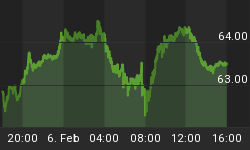Certain deflationists have recently gone on record saying that the increase in the Fed's balance sheet is meaningless with regard to creating inflation because our central bank can't print money, it can only create bank reserves. The problem with their view is that it both disregards the definition of money and ignores the process of creating bank reserves.
Money is commonly defined as "a medium that can be exchanged for goods and services and is used as a measure of their values on the market, including among its forms a commodity such as gold, an officially issued coin or note, or a deposit in a checking account or other readily liquefiable account." The Fed creates a "readily liquefiable account" when creating excess bank reserves, so it is also creating money. Since inflation is properly defined as an increase in the money supply, the Fed unquestionably creates both money and inflation when it creates reserves.
The deflationists' error is to suppose that because the amount of currency has not grown, the money supply hasn't grown. But the Fed never creates currency - all the printing is handled by Treasury; instead, it creates bank deposits which are held at the Fed. In ignoring this "base money," the deflationists make no distinction between having the Fed's balance sheet at $800 billion or $3 trillion. Doing so is a huge mistake for both making investment decisions and predicting asset price levels.
In short, for deflationists to be correct, they must contend that only money which is currently in circulation can be considered inflationary, i.e. lead to rising prices. Therefore, they must also believe that all increases in demand and time deposits should not be included in the money supply and should not be considered inflationary. This isn't just wrong, it's grossly wrong.
Not only do the Fed's monetary additions increase the money supply, but the effect can be vastly multiplied through the fractional reserve system.
Also, the process of creating bank reserves always first involves the purchase of an asset by the central bank. The Fed issues electronic credits to banks in exchange for bank assets, including Treasuries. Its purchases drive up the demand for those assets, bringing about rising prices. In fact, Bernanke has clearly stated that the purpose of his "quantitative easing" program is to raise the rate of inflation, which in his mind is too low.
What the Fed is accomplishing is a reduction in the purchasing power of the US dollar. It creates inflation by vastly increasing the money supply, and thus lowers the confidence of those holding the greenback. If international confidence in the dollar is shaken, most dollar-based asset prices will increase - with the exception of US debt.
Deflationists also ignore the rise in prices that is occurring because of the potential insolvency of the US government. It is not dissimilar to what happened to Enron shares. Once the accounting scandal broke, the purchasing power of Enron shares plummeted. It was not because of an increase in the number of shares outstanding, but because of an epiphany on the part of investors that the company was totally bankrupt. Logically, shares representing a stake in a doomed company lost all of their value. Likewise, aggregate prices will soar if global investors lose confidence in the dollar due to the realization that the US is incapable of servicing its debt.
Whatever the deflationists may claim about the money supply, the objective indicators are not looking good for Uncle Sam. The dollar's decline is abundantly evident when compared to gold, commodity prices, other currencies, real estate, and the list goes on. The national debt now stands at over $13.7 trillion, some 94% of GDP. Either due to an insolvent currency backed by a bankrupt nation or because of the Federal Reserve's endless money printing, I have no doubt that the deflationists have it completely wrong.
For in-depth analysis of this and other investment topics, subscribe to The Global Investor, Peter Schiff's free newsletter. Click here for your free subscription.
Click here to download Peter's latest Special Report: My Five Favorite Gold & Silver Mining Stocks.
Be sure to pick up a copy of Peter Schiff's hit economic fable, How an Economy Grows and Why It Crashes.















